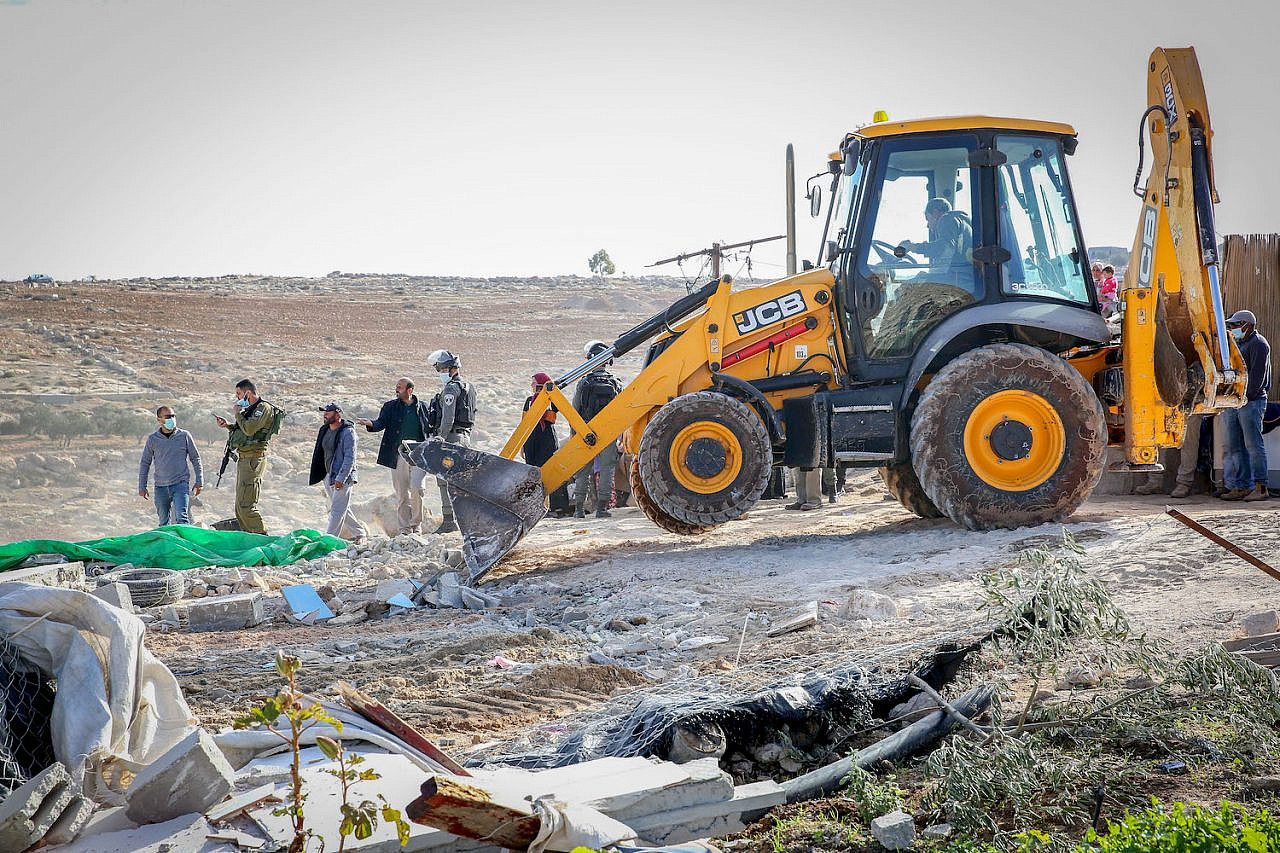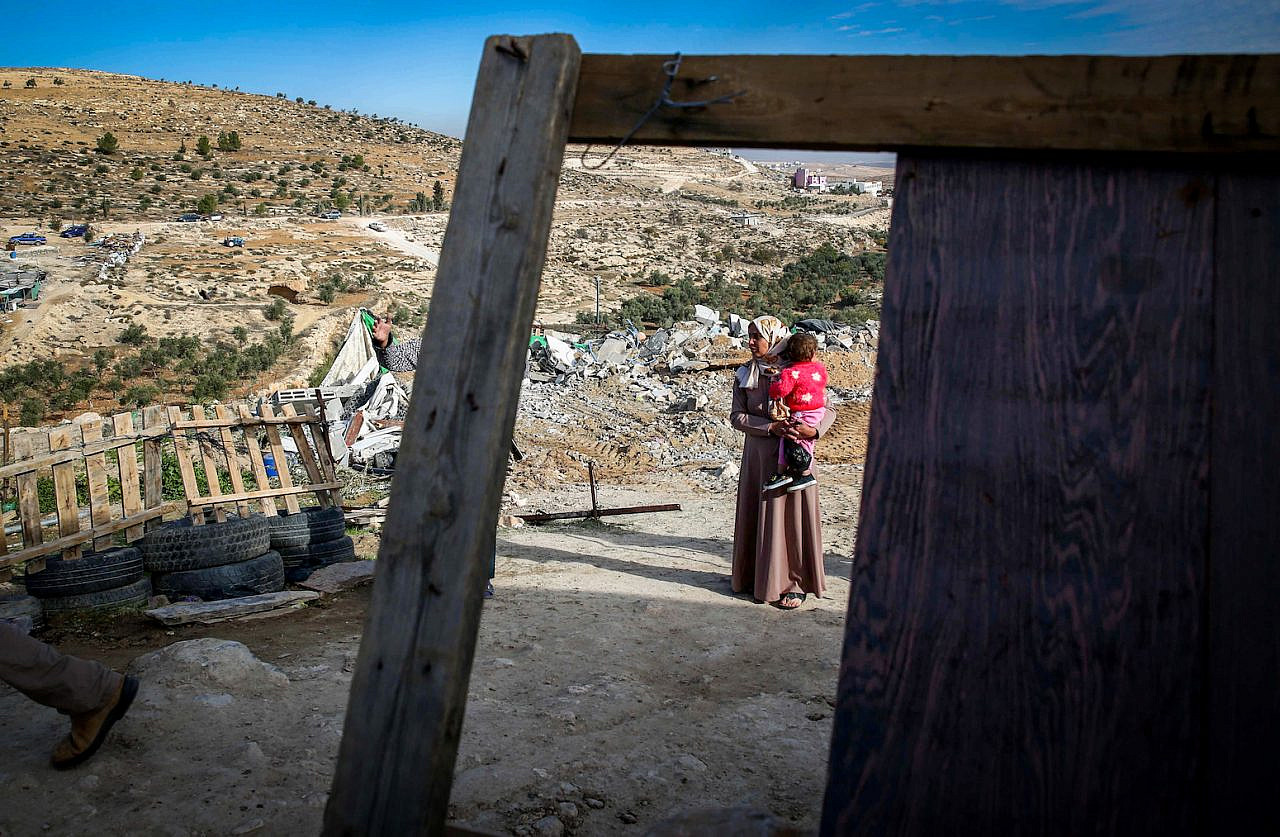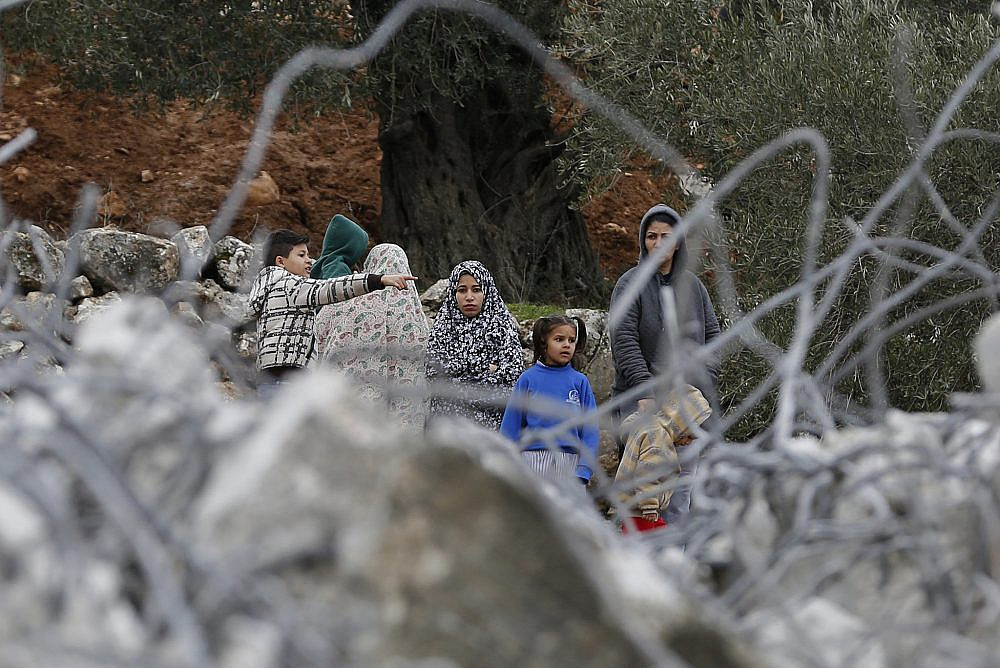For the children of the Abu Sabha family, the morning of Jan. 12 was a nightmare. As Israeli demolition forces rolled into their village of Al-Fakheit in the occupied West Bank, it became clear that the army’s sights were set on their building — which 18 people, including 11 children, called home.
The children looked on in horror as strange men from the Civil Administration — the arm of the Israeli military that governs the occupied territories — entered their house and began to empty it of the family’s belongings, removing furniture, pots and pans, and clothes in preparation for the demolition. Terrified, the kids watched as even their toys were taken by the occupation forces, with some wondering if their recreation was the crime that led to their home’s destruction.
It wasn’t just the home that was demolished that day; two sheep pens and a water well belonging to the family were also destroyed, jeopardizing their source of income. The women had tears in their eyes as they pleaded with the soldiers to spare at least one room so that they would have some shelter in the harsh winter.
Home demolitions in Masafer Yatta in the South Hebron Hills — where my home village of Susiya is located — happen almost every week, and are used by Israel as a method of transferring the Palestinian population out of Area C of the West Bank. With every demolition, we lose not only our homes but also our dreams and our sense of security. For our kids, it causes serious psychological trauma: even at home, the place where they should feel totally secure, the children of Masafer Yatta can never feel safe from the violence of settlers or the state.
In the early 1980s, Al-Fakheit, along with 11 other villages in Masafer Yatta, was declared by the Israeli army to be a ‘firing zone,’ and the future of the residents came under immediate threat. All construction in the area became illegal, and in 1999, all of the villages’ 700 residents were forcibly evicted.

Following a petition and decision from the Israeli High Court, the residents were allowed to return to their homes with limited rights to work their land. But their fate still remains in legal limbo. To this day, all construction in the area is illegal, and the occupation forces come almost every week to demolish structures including water wells and pipes, sheep pens, and houses.
Ongoing trauma
Growing up in Susiya, I experienced my own family home being destroyed at the age of 7, and then again at the age of 11. I have vivid memories of my father supporting me through those traumatic events. At one point, he lied and told me that he himself decided to demolish our home in order to build an even nicer one for the family. I understood later that he was trying to protect me from being frightened by the reality of occupation. Today, as a parent, I am particularly sensitive to the impact of these experiences on our children.
In the aftermath of January’s demolition in Al-Fakheit, I spoke with Mohammed Abu Sabha, the father of the household, about his family’s life after the destruction. The past few weeks have been excruciating for him as a parent. Since the demolition, the family has been living in a donated makeshift tent which hardly protects them from the harsh winter rain and wind. He worries constantly about the difficult conditions in the tent, and finding his family a new permanent home.
The overwhelming sentiment that Mohammed conveyed was concern over the trauma that his kids are continuing to experience as a result of the demolition. All of the Abu Sabha children grew up in the village and cherish the memories they had in the family home. But in the nights following the demolition, Mohammed’s kids were plagued by nightmares; he would hear them talking in their sleep, replaying the images of horror that occurred on that day, and muttering that the army was coming to destroy their home.
Mohammed believes that the ongoing demolitions in the area, which occur almost every week, make it difficult for his kids to move past the trauma they had experienced. Their precarious situation — still living in a tent — and the destroyed sheep pens make the family’s future very uncertain. The sheep are his family’s source of income, and they’ve had to improvise new means of sheltering and raising them in order to maintain their livelihood.

As a shepherd who has spent his whole life living on and from his land, Mohammed has no viable option for employment in the nearest city of Yatta. And as someone whose home was recently destroyed by the Israeli occupation forces, he is naturally unwilling to seek work inside the Green Line in order to provide for his family. As a result, there is no path forward for the family other than to continue living in Al-Fakheit, and to attempt to find a more comfortable housing situation than the tent.
The only house he had ever lived in
When I visited Mohammed and his family, I had the opportunity to speak with a few of the kids. During one of our conversations, one of Mohammed’s sons told me that when he grows up, he plans to destroy one of the houses of the people that destroyed his own home.
When I heard this, I was shocked. But upon deeper consideration, it made sense to me that the boy would feel this way: he experienced the destruction of his home as an innocent child, and had no other framework to help him make sense of the act of utter inhumanity that befell his family.
The boy understood what happened not on some legal dimension — in terms of firing zones and “illegal” construction — but on a purely human level. Invaders from a foreign land came into his village one morning and destroyed the only house he had ever lived in, stealing every semblance of warmth and security right from under his feet. In his youthful conception of morality, he feels that the only way to seek justice is to seek revenge, to hit back at those who had hurt him.
Hearing Mohammed’s son’s bitterness made me think more about the effect of the occupation on our kids, how it robs them of the hopes and dreams that most kids are free to have, and leads them to resent the world. I know from experience the trauma of having your home demolished, and I also know from experience the importance of having support from family and community. I can only hope that the kids of Al-Fakheit receive the same level of support as I was lucky to have as a child, so that they can grow up to be upright members of their community.
Mohammad’s family has been able to access some level of mental health support through social workers from Doctors without Borders (MSF), attending sessions every week to try to process their trauma. While this is a good start, these kids need much more support in order to grow up with a positive attitude toward the world despite their impossible surroundings.
The immediate physical distress brought about by the destruction of the house is serious, but in my eyes, the loss of the house itself is not even the biggest impact of these demolitions. The deeper and more long-lasting effect is the loss of stability and security for children who lose their homes — the place where they are supposed to feel the most safe. When a child experiences such state violence, that harm stays with them for the rest of their life.

